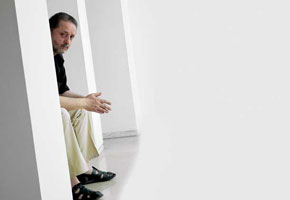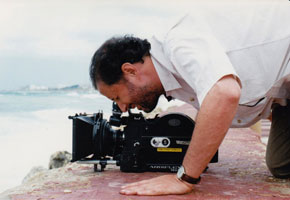شهادة فرج بيرقدار

نادي القلم العالمي يحتفي بخمسين كاتباً خمسة منهم عرب
يحتفل نادي القلم العالمي في هذا العام 2010 بالذكرى السنوية الخمسين على تأسيسه لجنة “كتَّاب في السجن”، التي أخذت على عاتقها، منذ تأسيسها 1960، مهمة الدفاع عن عشرات آلاف الكتّاب المضطهدين والسجناء.
تتضمن خطة اللجنة في هذه المناسبة عدداً من الأنشطة والفعاليات العالمية على مدار السنة، من بينها اختيار 50 كاتباً للاحتفاء بهم كحالة رمزية أو تمثيلية لجميع من دافعت عنهم اللجنة خلال 50 عاماً، أي لكل سنة كاتب.
وقد طلبت اللجنة من الكتّاب الأحياء الذين تضمهم القائمة تقديم بيان أو تصريح أو شهادة موجزة حول حرية التعبير ورأيه فيما قام به نادي القلم من دفاع عنه أو عن الآخرين، ليصار فيما بعد إلى جمعها وإصدارها في كتاب.
تضمنت القائمة أسماء كتّاب من جنسيات مختلفة دافعت عنهم اللجنة سابقاً، منهم جوزيف برودسكي رمزاً لعام 1963، وول سوينكي لعام 1965، يانيس ريتسوس لعام 1969، برايتن برايتنباغ لعام 1975، فاكلاف هافل لعام 1979، نوال السعداوي 1981، منصور راجح لعام 1983، فرج بيرقدار لعام 1988، سلمان رشدي لعام 1989، كين سارو ويوا لعام 1995، تسليمة نسرين لعام 1996، فرج زركوحي لعام 1997، سهام بن سدرين لعام 2001، دافيت إيساك لعام 2002، علي لمرابط 2004 ليديا كاتشو لعام 2005، آنا بوليتكوفسكايا لعام 2006، هرانت دينك لعام 2007.
وقد حصلنا على نص الشهادة الموجزة التي أرسلها الشاعر السوري فرج بيرقدار بنصها العربي وترجمتها اللجنة إلى الإنكليزية.
وفيما يلي النص العربي وترجمته الإنكليزية:
شهادة فرج بيرقدار- سوريا- ممثلاً لعام 1988.
حرية التعبير بالنسبة إلي مُسَلَّمة لا تقبل تأويلاً ولا تمويهاً ولا مساومة.
إنها في أحد وجوهها مسألةُ أن أكون إنساناً أو لا أكون، وهي في وجه آخر، لا يقلُّ أهمية، مسألةُ أن أكون كاتباً أو لا أكون.
منذ الخطوات الأولى لي على طريق الكتابة، كنت أدرك أنني قد اخترت طريقاً شائكاً وعِراً ومحاطاً بالكمائن.
في ثقافتي الإسلامية، والقرآنية خصوصاً، كثيراً ما لفت انتباهي ذلك الاقتران بين النبوَّة والشعر والجنون!
هي حالات ثلاث يتميز أصحابها بجرأتهم على إعلان ما يعتقدون أنه حقيقة، ولعل ذلك ما جعل الطغاة عبر التاريخ يخشونهم وينكِّلون بهم.
خلال السنوات العشر الأولى من اعتقالي، كنت أشعر أني جزء من تراجيديا ذلك التاريخ القديم المحكوم بأقدار غامضة لا سبيل إلى الإفلات من مواجهتها.
ولكن في سنوات السجن اللاحقة (ومع تسرُّب بعض الأخبار عما يفعله نادي القلم العالمي واللجنة العالمية لمناهضة القمع والأمنستي ومنظمة صحفيين بلا حدود دفاعاً عني وعن حريتي) تفتَّحتْ في داخلي مشاعر مختلفة تماماً، وأيقنت أني لم أعد منسياً.. ينبغي علي الاعتراف هنا بأن النسيان بالنسبة للسجين إنما هو نوع من الموت المعنوي.
أصبحتُ أكثر ثقة بنفسي وبالإنسان وبأهمية الكلمة، وإن شئتم بقداستها.
تغيَّرَ سلوك إدارة السجن معي في كثير من الأمور، بدءاً من العناية الصحية ووقف الإهانات الجسدية والمعنوية، مروراً بتحسين شروط الزيارات وانتهاء بتيسير متطلبات الحياة اليومية.
ولعل الدور الأبرز، الذي لعبته ضغوط ومناشدات نادي القلم العالمي وغيره من المنظمات المعنية بحرية التعبير وحقوق الإنسان، تمثّل في اضطرار السلطات السورية إلى الإفراج عني قبل انتهاء حكمي بسنة وأربعة شهور، وكان في ذلك سابقة، إذ لم يحدث أبداً من قبل أن أفرجت السلطات السورية عن أي سجين سياسي قبل انتهاء حكمه، ولا حتى مع انتهاء حكمه، فالعادة هي الاحتفاظ بالسجناء السياسيين بضع سنوات إضافية بعد انتهاء مدة الحكم، بالإضافة إلى إجبارهم على توقيع تعهُّدات مذِلَّة بتركهم للعمل السياسي، وبتأييد سياسة النظام، وبمراجعات أو زيارات دورية لفروع أجهزة المخابرات والإبلاغ عن كل شخص معارض يتصل بهم.. إلخ.
اهتمام نادي القلم العالمي بي شكَّل لي حماية استثنائية داخل السجن، ومنحني فرصة حريتي قبل وقتها، وجنَّبني كل الضغوط والإذلالات التي ترافق إطلاق السراح.
وعلى أهمية كل ذلك أرى أن من واجبي الإشارة إلى أن ما قدَّمه لي نادي القلم العالمي من حصانة رمزية ودعم مادي ومعنوي، منذ الإفراج عني حتى الآن، لا يقل أهمية عن كل ما سبق.
Testimony from Faraj Bayrakdar, Syria (1988).
Translated from the Arabic by Temple Translations
For me freedom of expression is something non-negotiable, and which cannot be explained away or glossed over or haggled over. In one sense it is a question of whether one is a human being or not, and in another – no less important – sense it is a question of whether one can be a writer or not.
Since my first steps along the path of being a writer, I have been well-aware that I have chosen a rocky path and a way which is strewn with pitfalls.
In my Islamic culture, and Koranic culture in particular, my attention has been much drawn towards the proximity of prophesy, poetry and madness!
In all these three areas, the protagonist is characterised by the courage to declare what he/she believes to be the truth, even if over the course of history people have taken it amiss and feared it and recoiled from it.
During the first ten years of my detention I felt that I was part of that same tragedy by which many throughout history have been oppressed by blind forces from which there is no escape.
However, during the subsequent years in prison (and when some news leaked through about what the International PEN Club was doing for me, as well as the International Committee for Resistance to Oppression, and Amnesty, and the Journalists without Frontiers organisation who were defending me and my freedom) some completely different feelings arose within me and I realised that I had not been forgotten…. and I must acknowledge here and now that for prisoners, the thought that they are forgotten is a sort of spiritual death.
I began to feel more confidence in myself and in humanity and in the importance of the written word – if we want to sanctify it.
The attitude of the prison authorities changed towards me in respect of everything, starting with improved health care and the cessation of the physical and moral insults made against me. This then developed through improved visiting conditions and ended with improved availability of the necessities of daily life.
However, the most important role that the pressure and appeals brought to bear by the International PEN Club and the other organisations which support freedom and human rights, played, was that the Syrian authorities were obliged to release me one year and four months before the end of my sentence. There was a precedent for this, but it had never happened before that the Syrian authorities had released any political prisoner before the end of their sentence – and indeed they are often not released even at the end of their sentence. Political prisoners are usually kept in prison for further years after the end of their sentence as well as being forced to sign oppressive undertakings to abjure political activity and to support the policy of the regime and to regularly report to or attend the branches of the intelligence services and inform on any opponent who has come to their attention … etc.
The attention paid to me by the International PEN Club gave me a special sort of protection while I was in prison and it gave me my freedom before I could have expected it and meant that I avoided all the pressures and humiliations which would normally have been imposed upon release.
In addition to all this, I would like to draw attention to the symbolic immunity and physical and moral support which the International PEN Club has given me since my release and up to the present time, which is no less valuable and important than the assistance which they gave prior to that.
خاص – صفحات سورية –




